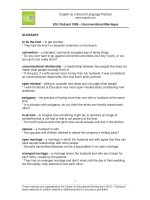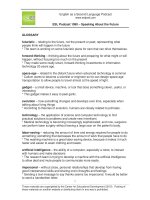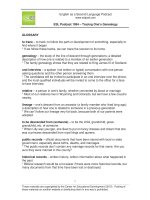ESLPod 1118 guide Want to be Fluent in English?
Bạn đang xem bản rút gọn của tài liệu. Xem và tải ngay bản đầy đủ của tài liệu tại đây (96.49 KB, 10 trang )
English as a Second Language Podcast
www.eslpod.com
ESL Podcast 1118 – Bidding on Online Auctions
GLOSSARY
to bid – to state how much one will pay for something in a competitive
environment with two or more buyers
* At the school fundraiser, parents bid on items donated by local businesses.
auction – an event where items are sold to the person willing to pay the highest
price for them
* When the Jeffersons passed away, their children organized an auction to sell
off their art collection.
last minute – at the last possible opportunity to do something; immediately
before something ends or closes
* They paid their electric bill at the last minute, just before service would have
been turned off.
buy-it-now – the price at which someone can buy something immediately in an
auction, without having to bid against other people or wait for the end of the
auction
* The buy-it-now price is five times higher than anyone would pay for it. Look how
low the bids are in comparison.
shipping – the process and costs associated with mailing a purchased product
from the manufacturer or store to the buyer
* Shipping is a huge cost for companies that sell heavy products made from
metal or stone.
minimum bid – the smallest bid that will be considered as a price; the smallest
price that a buyer is allowed to offer
* Setting a minimum bid lets the seller make sure that valuable items aren’t sold
for a ridiculously low price.
current bid – the highest bid at the moment when the auction has not ended yet,
so the price might increase if more bids are received
* We’ll keep bidding for a while, but if the current bid gets to $300 we’ll need to
drop out.
reserve – the minimum price at which something will be sold; a price set by the
owner of an item that, if not met, results in the item not being sold
* The bidding has been pretty slow. They haven’t even reached the reserve yet.
1
These materials are copyrighted by the Center for Educational Development (2015). Posting of
these materials on another website or distributing them in any way is prohibited.
English as a Second Language Podcast
www.eslpod.com
ESL Podcast 1118 – Bidding on Online Auctions
to snag (something) – to buy something at a very low price; to get something in
a very lucky way
* We snagged this gorgeous bedroom furniture for just $100 at a garage sale.
to place – to enter, set, establish, or register something
* Did you place the order on the store’s website or over the phone?
increment – interval; one of several small increases in the value or amount of
something
* They paid off the balance of the loan they owed their parents in $50 increments.
maximum bid – the greatest amount of money that one is willing to pay for
something, especially when entered into a computer system that conducts the
bidding automatically
* Just enter your maximum bid, and the software program will automatically
increase your bid up to that amount against other bidders.
to outbid (someone) – to place a bid that is higher than another person’s bid,
resulting in the other person not being able to buy the item in the auction
* They have enough cash to outbid everyone else at the auction.
to sneak in – to do something secretly in a hidden and unnoticed way when one
does not want to be seen
* The little boy snuck into the kitchen and stole some cookies.
to snipe – to place the highest bid immediately before an auction ends so that
one can buy the item
* I was the highest bidder for the last 20 minutes, but in the last few seconds
someone sniped me.
timing – when certain things are done or when certain things happen, especially
as part of a plan
* The police officers’ timing has to be perfect if they’re going to catch the thief
before she disappears with the money and jewels.
to list (something) – to upload information about something that is for sale onto
a website where potential buyers can see and/or read about it
* Did you list your baby clothes on eBay, or did you give them to friends?
2
These materials are copyrighted by the Center for Educational Development (2015). Posting of
these materials on another website or distributing them in any way is prohibited.
English as a Second Language Podcast
www.eslpod.com
ESL Podcast 1118 – Bidding on Online Auctions
COMPREHENSION QUESTIONS
1.
a)
b)
c)
What could cause an auction to end early?
When someone pays the buy-it-now price
When someone pays for the shipping
When someone places a maximum bid
2.
a)
b)
c)
How could someone snipe Bethany?
By lying to her about the item she is buying
By tricking her into paying more than she should
By placing a higher bid right before the auction ends
______________
WHAT ELSE DOES IT MEAN?
bid
The verb “to bid,” in this podcast, means to state how much one will pay for
something in a competitive environment with two ore more buyers: “We placed a
few bids on the painting, but we can’t really compete with wealthier buyers.” The
word “bid” can also be used as a noun to refer to the amount of money in an
offer: “The real estate agent recommended rejecting the first few bids on the
home because they were too low.” The phrase “a bid for power” describes an
attempt to become powerful: “He bought some nice suits and started golfing with
executives in a failed bid for power within the company.” Finally, the phrase “to
do (someone’s) bidding” means to follow instructions and do what one has been
told to do: “Jerome doesn’t like to do his bosses’ bidding when he has to fire
employees.”
to list
In this podcast, the verb “to list” means to upload information about something
that is for sale onto a website where potential buyers can see and/or read about
it: “Why did you list my favorite chair without asking me about it first? I don’t want
to sell it!” Generally, a “list” is a group of items written in a column, one above the
next: “I’m sorry, but I don’t see your name on the list of invitees.” A grocery list is
a list of all the food items one plans to buy at the store: “Please add eggs to the
shopping list.” A “laundry list” is a list of many different, almost unrelated things:
“She had such a long laundry list of complaints about the restaurant!” Finally, the
“honors list” is a list of the best-performing students in a particular school or
program: “Ryosuke is so smart. He is on the honors list every year.”
3
These materials are copyrighted by the Center for Educational Development (2015). Posting of
these materials on another website or distributing them in any way is prohibited.
English as a Second Language Podcast
www.eslpod.com
ESL Podcast 1118 – Bidding on Online Auctions
CULTURE NOTE
Seized Property Auctions
Sometimes “law enforcement officers” (police officers and people with related
jobs) have to “seize” (take without permission) “personal property” (things that
are owned by individuals) in the “course of their duties” (while performing their
regular jobs). This is common when law enforcement officers find “evidence”
(proof that something has happened) of drug “trafficking” (buying and selling of
illegal things) or terrorist activities. If the criminal is “found guilty” (determined to
have committed the crime), it may not be clear who the seized personal property
belongs to, given that it was “obtained” (acquired; gotten) through criminal
activity. In these cases, the law enforcement “agency” (government department
or organization) may “hold” (organize) a “seized property auction,” giving local
citizens an opportunity to bid on the seized property.
Similarly, banks that have “foreclosed on a home” (taken ownership of a home
because the people who received the home loan are no longer making
payments) hold auctions to sell off the home and any items left inside it. They do
this in an effort to “recover” (get back) the money they loaned to the buyers.
The items sold in seized property auctions, especially ones resulting from drug
trafficking, are often “luxury items” (products that are expensive and very nice to
have) such as “sports cars” (cars that can be driven very fast) and jewelry, so
bidders have an opportunity to snag these items “at a bargain” (for a much lower
price than typical or expected). The “proceeds” (money received; profits) from the
auction are typically “funneled back” (returned; given) to the bank or the law
enforcement agency.
______________
Comprehension Questions Correct Answers: 1 – a; 2 – c
4
These materials are copyrighted by the Center for Educational Development (2015). Posting of
these materials on another website or distributing them in any way is prohibited.
English as a Second Language Podcast
www.eslpod.com
ESL Podcast 1118 – Bidding on Online Auctions
COMPLETE TRANSCRIPT
Welcome to English as a Second Language Podcast number 1,118 – Bidding on
Online Auctions.
This is English as a Second Language Podcast episode 1,118. I’m your host, Dr.
Jeff McQuillan, coming to you from the Center for Educational Development in
beautiful Los Angeles, California.
Go to ESLPod.com and download a Learning Guide for this episode. You can get
the Learning Guide by becoming a member of ESL Podcast – more information
on our website.
This episode is a dialogue between Jermaine and Bethany about buying things
online. Let’s get started.
[start of dialogue]
Jermaine: Wait! You shouldn’t bid on that auction right now. Wait until the last
minute.
Bethany: This auction has a buy-it-now price of $25 and free shipping.
Jermaine: Don’t pay the buy-it-now price. The minimum bid on this item is $10
and the current bid is only $12.50. There’s no reserve, so if you wait to bid, you
may snag it for a much lower price than $25.
Bethany: Okay, I guess I can wait, but why can’t I place a bid of $15 right now?
Jermaine: First of all, the bidding on this auction goes up by increments of 50
cents, so the next bid would be $13. You could place a maximum bid of $15, but
someone might outbid you at any time.
Bethany: But couldn’t that happen anyway? Even if I wait until the last minute
someone could sneak in and bid a higher price.
Jermaine: You mean they could snipe you? They could, but not if you snipe them
back. It’s all in the timing.
Bethany: You seem to know a lot about online auctions.
Jermaine: That item you’re bidding on, guess who listed it?
5
These materials are copyrighted by the Center for Educational Development (2015). Posting of
these materials on another website or distributing them in any way is prohibited.
English as a Second Language Podcast
www.eslpod.com
ESL Podcast 1118 – Bidding on Online Auctions
[end of dialogue]
Jermaine says to Bethany, “Wait!” meaning “Stop – don’t do what you are about
to do.” He says, “You shouldn’t” – you should not – “bid on that auction right now.
Wait until the last minute.” “To bid” (bid) is to say how much you are willing to pay
for something, usually in a situation where there is more than one person
interested in buying whatever it is you’re interested in buying. Normally we bid at
an event called an “auction” (auction).
An “auction” is where either someone in person (standing in front of you) or
online is selling something, and a number of different people are interested in
buying it. Each person says how much he or she is willing to pay for it. When you
say how much you want to pay for something – when you are, in effect, offering
to buy something – that’s called a “bid.”
So you’re not just saying, “Oh, I would pay $50.” You are saying, “I will pay,”
because if your bid is accepted – if you, what we would call, “win the auction” –
then you have to pay $50 to buy whatever it is you bid on. “To bid on” means to
give a price that you are willing to pay for a certain object, to make an offer on a
item. We use the preposition “on” after the verb “to bid” to describe the item that
you want. “I bid on a car.” “I bid on a house.” “I bid $30.” If you’re just giving the
actual price that you are offering or willing to pay, then there is no preposition
“on” after the verb.
Anyway, back to the story. Jermaine says to Bethany, “You shouldn’t bid on that
auction right now. Wait until the last minute.” Now, Bethany is bidding on an
online auction. “Online” means, of course, on the Internet. One online auction
website is “eBay” (eBay). Jermaine says that Bethany should “wait until the last
minute,” meaning wait until the auction is just about to end.
Bethany says, “This auction has a buy-it-now price of $25 and free shipping.” On
some websites, such as eBay, you don’t have to bid against other people for
certain items. Some sellers, people who are selling things, will say, “Well, here’s
a price that I will take and give it to you right now. I won’t worry about taking any
bids.” That’s called the “buy-it-now” price. Pretty logical, right? “Free shipping”
means that the seller won’t add an additional cost on to the price of the item to
pay for the shipping – the process of mailing something to you.
Now, not everything that you buy is shipped; sometimes you buy things that are
“virtual” (virtual). Virtual items are things that you download or you access on
your computer. So this item, this auction, has a “buy-it-now price of $25.” (I say
6
These materials are copyrighted by the Center for Educational Development (2015). Posting of
these materials on another website or distributing them in any way is prohibited.
English as a Second Language Podcast
www.eslpod.com
ESL Podcast 1118 – Bidding on Online Auctions
“this auction” – I mean this auction for an item of $25.) Jermaine, however, says,
“Don’t pay the buy-it-now price. The minimum bid on this item is $10 and the
current bid is only $12.50.”
What happens when you put an item into an online auction site such as eBay
(and I’m using eBay because I’m familiar with it, and it’s popular here in the
U.S.), you are given the option of putting a minimum bid. That means you say,
“This is the least amount of money I will accept.” You’re hoping for more, but you
won’t take any less than this amount. That is your “minimum (minimum) bid.”
“Minimum” means the least. The opposite would be “maximum” (maximum), but
nobody has a maximum bid. Sellers will take however much money you want to
give them.
Jermaine says that the minimum bid on this item is $10. What he’s saying is that
the buy-it-now price is $25, and so far the highest bid is only $12.50. So maybe
you can get it cheaper, Jermaine is saying, if you bid on it rather than paying the
buy-it-now price. Why would you buy it now rather than bid on it? Well it may be
because you want the item right away. You don’t want to wait, and some of these
auctions last three or even six or seven days. I’m not sure exactly how many
days the typical eBay auction lasts, but usually it’s more than a couple of days.
Jermaine continues, “There’s no reserve, so if you wait to bid, you may snag it for
a much lower price.” The minimum bid, I mentioned earlier, is the least amount of
money that you will accept for an item. However, you actually can put into the
auction system what’s called a “reserve” (reserve). The “reserve” is your secret, if
you will, minimum bid. So if you say to someone, “The minimum bid is $10,” that
doesn’t mean that if they bid $10 you will say yes. You could also put a “reserve.”
Now, you don’t tell people what the reserve is, but the reserve is the minimum
price you will actually accept. It’s a little confusing. The “minimum bid” is what
you tell people on the website is the least amount of money that you can bid.
That doesn’t mean if you bid the minimum bid you will get the item, because you
could also have a “reserve,” which is a higher price that you will have to get in
order to agree to sell the item.
You can tell on these websites often whether someone has a reserve or not. If
the person has no reserve, then the minimum bid is, in effect, the reserve. It’s the
minimum price the seller will accept. Jermaine says that Bethany could “snag”
(snag) the item for a lower price. “To snag” something is to buy it at a very low
price – to get something cheap, usually due to some sort of luck. Bethany says,
“Okay, I guess I can wait, but why can’t I place a bid of $15 right now?” “To place
a bid” means the same as “to bid.”
7
These materials are copyrighted by the Center for Educational Development (2015). Posting of
these materials on another website or distributing them in any way is prohibited.
English as a Second Language Podcast
www.eslpod.com
ESL Podcast 1118 – Bidding on Online Auctions
Jermaine says, “First of all, the bidding on this auction goes up by increments of
50 cents.” “Increments” (increments) are intervals, small increases in the value of
something. You can’t, for example, bid on some items $10.05. You in many
cases have to bid only in 50-cent or one-dollar increments, meaning the next
highest bid has to be 50 cents above the previous bid. So the next bid after
$12.50 (if you’re still awake out there) is $13. “You could place a maximum bid,”
Jermaine continues, “of $15, but someone might outbid you at any time.”
The maximum bid is your secret price, the amount that you will pay – the most
that you will pay, I should say – for an item. So, I put into the website the
maximum amount I will pay. Now, why would I do this? Well, because people
may come on later when I’m sleeping and bid more than what my bid was. The
auction site will automatically add a bid for me up to my maximum bid. The verb
we use when someone bids more than you and ultimately gets the item is
“outbid” (outbid). “I was outbid by this person,” or “This person outbid me.”
Bethany says, “But couldn’t that happen anyway? Even if I wait until the last
minute” – meaning right before the auction ends – “someone could sneak in and
bid a higher price.” “To sneak (sneak) in” means to do something secretly in a
hidden and unnoticed way – when you don’t want to be seen. Bethany is
complaining that someone could bid higher than her right at the very last minute,
right when the auction is about to end.
Jeremy says, “You mean they could snipe you?” To sneak in at the last minute in
an auction has a special verb, and that verb is “to snipe” (snipe). I’m not sure if
this is a verb that was invented for the Internet age, but it is the verb that is used
by people on online auction sites. “To snipe” means to get the highest bid
immediately before the auction ends – sometimes just seconds before the
auction ends.
Jeremy says “They could,” meaning someone could snipe you, “but not if you
snipe them back,” meaning not if you get in before them with a higher bid. “It’s all
in the timing,” Jermaine says. “Timing” (timing) is when you should do certain
things, especially as part of a plan. We often talk about comedians having good
timing or bad timing. It has to do with how long they wait before they tell the next
part of the joke.
Bethany says to Jermaine, “You seem to know a lot about online auctions.”
Jermaine says, “That item your bidding on, guess who listed it?” “To list” (list)
something on an auction site is to put it on the website to sell – to upload
information or put information into the website so that people can then later bid
8
These materials are copyrighted by the Center for Educational Development (2015). Posting of
these materials on another website or distributing them in any way is prohibited.
English as a Second Language Podcast
www.eslpod.com
ESL Podcast 1118 – Bidding on Online Auctions
on your item. Jermaine is saying that the item that Bethany is bidding on is one
that he himself listed. That’s why he says, “Guess who listed it?” The implication
here is that Jermaine listed the item.
Now let’s listen to the dialogue, this time at a normal speed.
[start of dialogue]
Jermaine: Wait! You shouldn’t bid on that auction right now. Wait until the last
minute.
Bethany: This auction has a buy-it-now price of $25 and free shipping.
Jermaine: Don’t pay the buy-it-now price. The minimum bid on this item is $10
and the current bid is only $12.50. There’s no reserve, so if you wait to bid, you
may snag it for a much lower price than $25.
Bethany: Okay, I guess I can wait, but why can’t I place a bid of $15 right now?
Jermaine: First of all, the bidding on this auction goes up by increments of 50
cents, so the next bid would be $13. You could place a maximum bid of $15, but
someone might outbid you at any time.
Bethany: But couldn’t that happen anyway? Even if I wait until the last minute
someone could sneak in and bid a higher price.
Jermaine: You mean they could snipe you? They could, but not if you snipe them
back. It’s all in the timing.
Bethany: You seem to know a lot about online auctions.
Jermaine: That item you’re bidding on, guess who listed it?
[end of dialogue]
The scripts for our episodes are, I think, priceless. Thanks to the wonderful work
by the wonderful Dr. Lucy Tse.
From Los Angeles, California, I’m Jeff McQuillan. Thank you for listening. Come
back and listen to us again right here on ESL Podcast.
9
These materials are copyrighted by the Center for Educational Development (2015). Posting of
these materials on another website or distributing them in any way is prohibited.
English as a Second Language Podcast
www.eslpod.com
ESL Podcast 1118 – Bidding on Online Auctions
English as a Second Language Podcast was written and produced by Dr. Lucy
Tse, hosted by Dr. Jeff McQuillan. Copyright 2015 by the Center for Educational
Development.
10
These materials are copyrighted by the Center for Educational Development (2015). Posting of
these materials on another website or distributing them in any way is prohibited.









